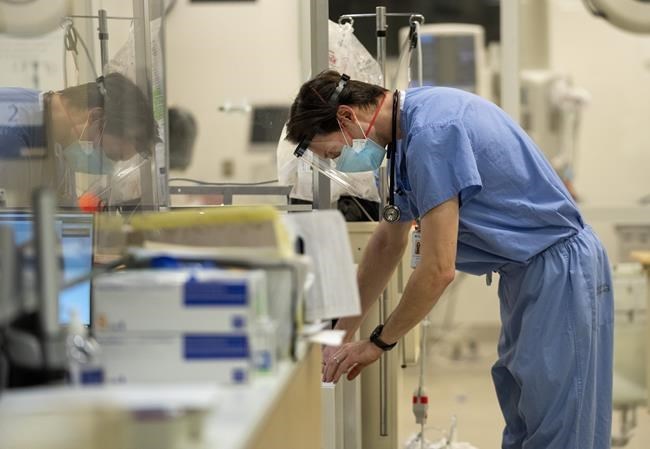HALIFAX — Canadian doctors spend 18.5 million hours per year on unnecessary administrative work — the equivalent of more than 55 million patient visits — a report published Monday by the Canadian Federation of Independent Business says.
Dr. Leisha Hawker, president of Doctors Nova Scotia, which represents all licensed physicians in the province, said eliminating paperwork redundancies and shortening medical forms can improve patient care and reduce burnout experienced by doctors.
“A lot of physicians are typically doing this work after hours, early in the morning before clinics open, on non-existent lunch breaks, or after the sun goes down,” Hawker said in an interview. She said administrative work typically involves “navigating clumsy electronic medical records or filling out forms.”
A physician spends more than 10 hours a week on medical paperwork, she said, much of which is required by the provincial government for programs like pharmacy care or disability support. Hawker said that some medical forms are necessary, but many are longer and more detailed than they need to be.
The Canadian Federation of Independent Business report, titled "Patients before Paperwork," recommends that provinces reduce red tape in medicine by 10 per cent. The federation estimates that nationally, 10 per cent less paperwork would save time equivalent to 5.5 million patient visits.
Hawker said both doctors and patients would see the benefit.
“If we improve the efficiency of the forms by 10 or 20 per cent — because of the sheer volume of time that forms take to be completed by physicians — that would be a pretty dramatic improvement,” she said. In Nova Scotia, she said, a 10 per cent reduction in time spent on paperwork would theoretically allow for about 150,000 more patient visits per year.
“The things that bring physicians joy in medicine are actually talking to patients and helping improve their health and their lives. Anything that's taking physicians away from direct patient care is contributing to burnout,” she said.
Laura Jones, an executive vice-president with the business federation and co-author of the report, said in an interview Monday that Nova Scotia is leading the way in Canada in reducing red tape in medicine.
She said that as Canadians worry about strain on the health system, looking at reducing unnecessary administrative work efficiency is “too often overlooked.”
“Red tape reduction is an incredibly powerful tool that has a lot of potential to improve lives,” Jones said.
Doctors Nova Scotia has been working with the Department of Health and the Office of Regulatory Affairs since 2019 to identify paperwork redundancies. So far, three forms used by Nova Scotia physicians have been simplified.
The professional medical association estimates that out of the 1.36 million hours of work a year spent by physicians on administrative tasks, about 500,000 of these hours are doing work that is unnecessary. Before the CFIB report, Doctors Nova Scotia had made a goal of reducing administrative work hours by 50,000 hours a year.
The national estimates in the new study are extrapolated to all provinces data from a 2020 Nova Scotia study. That study, conducted by Doctors Nova Scotia and the Office of Regulatory Affairs and Service Effectiveness, interviewed 500 physicians who reported that on average, 38 per cent of their administrative work is unnecessary.
Federation spokesperson Dariya Baiguzhiyeva said the organization chose to study medical administrative burden because its members have said health care should be a top priority for government. "In looking at how to navigate this area on behalf of our members, we identified red tape concerns among physicians as an area where we could do some work," Baiguzhiyeva said in an email.
This report by The Canadian Press was first published Jan. 30, 2023.
---
This story was produced with the financial assistance of the Meta and Canadian Press News Fellowship.
Lyndsay Armstrong, The Canadian Press




